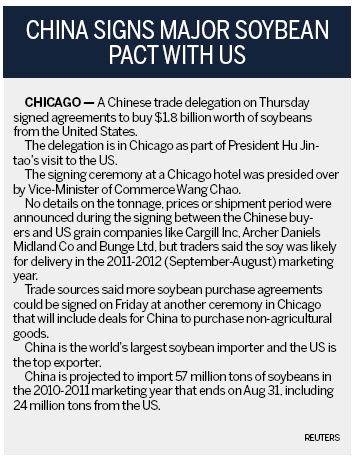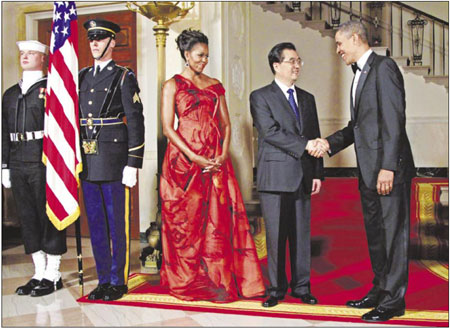China
Hu's visit shifts direction in ties
By Ding Qiangfen (China Daily)
Updated: 2011-01-21 13:46
 |
Large Medium Small |
|
President Hu Jintao is greeted by US President Barack Obama and First Lady Michelle as they arrive for a state dinner at the White House in Washington on Wednesday. Carolyn Kaster / Associated Press |
Beijing's purchase of $45 billion in goods will support up to 235,000 jobs
BEIJING - President Hu Jintao's visit and the joint statement with the United States provide a "brand-new platform" for the two sides to strengthen economic ties, despite some divergent views, experts said.
Hu arrived in Washington on Tuesday and was formally welcomed by his counterpart Barack Obama on the South Lawn of the White House. After the official talks, China and the US signed a joint statement saying the two nations are committed to working together to build a "cooperative partnership based on mutual respect and mutual benefit".
Chinese experts warmly welcomed the outcome, saying economic relations are witnessing a "positive" shift.
"So far, so good," said Zhou Shijian, senior expert at the Center for US-China Relations at Tsinghua University.
"The economic issues are playing a more important role in the bilateral relations, and the economic cooperation between China and the US will be closer and wider," Zhou said.
China and the US have been involved in a series of trade conflicts during the past year, including the currency issue, which raised concerns that economic relations would turn for the worse.
But the new partnership "removes the doubts and strengthens the confidence of the two sides", said Huo Jianguo, director of the Chinese Academy of International Trade and Economic Cooperation with the Ministry of Commerce.
"China-US economic relations are shifting for the better, and a new mode of cooperation under the agreement is coming into shape," he added.
In the joint statement, the Chinese government pledged to "intensify efforts to expand domestic demand, to promote private investment in the service sector and to give greater play to the fundamental role of the market in resource allocation".
The US said it will work on "reducing its medium-term federal deficit and ensuring long-term fiscal sustainability, and will maintain vigilance against excess volatility in exchange rates".
Obama did not play up the currency issue, which has received criticism from congressmen and lawmakers, but did say "the renminbi is undervalued," during a joint news conference with Hu. And he also said that the relationship goes beyond "old stereotypes".
"A positive signal is that the Obama administration is taking a more pragmatic attitude toward treating bilateral relations. Actually it has to be like that, because the process of China's modernization and the nation's transformation of its mode of economic development is providing the US unprecedented commercial benefits," said Zhou.
Before Hu's state visit, high-level officials from the US, including Treasury Secretary Timothy Geithner and Commerce Secretary Gary Locke, said the two nations should strengthen cooperation and that the relationship has created huge benefits to both sides.
As part of the state visit, China will purchase $45 billion of goods in the US, including a $19-billion deal for 200 Boeing airplanes, said the White House on Wednesday. Besides the Boeing deal, China will also buy from agricultural, telecommunications and technology companies, including General Electric, Honeywell and Navistar. The White House said the deals will support up to 235,000 jobs in the US.
Chen Deming, China's commerce minister, said at a press briefing in Washington that the two sides will sign contracts worth $5.1 billion for two-way investment, and Chinese investment in the US will be as high as $3.2 billion.
The US-China Business Council cited the trade and investment agreements as a "positive reminder" of the importance of the US-China commercial relationship.
"The announced export sales of $45 billion supports jobs in the United States. China is the only major market to meet President Obama's goal of doubling exports in the next five years," said John Frisbie, president of the council.
Minister Chen also said that China's currency policy is not a major source of China's trade surplus with the US.
China will "review its trade policies and formulate measures to promote imports, with particular attention on economies with trade deficits with China, including the US and some European Union member states," he said.
Hu said in the White House that the Chinese government protects intellectual property rights of all registered businesses in China and will not link its innovation policies to the provision of government procurement preferences.
"China's pledge to separate its innovation and government procurement policies is new and potentially significant," said Frisbie, adding it was one of the council's top priorities for Hu's visit.
China Daily

